Entrepreneurship: Small Business Management, Economic Analysis Report
VerifiedAdded on 2023/01/19
|19
|6551
|96
Report
AI Summary
This report delves into the realm of entrepreneurship, examining various types of entrepreneurial ventures, including public and private sector ventures, and their typologies, such as small business, scalable start-up, large company, and social entrepreneurship. It explores the similarities and differences between these ventures, highlighting the distinctions between small and large-scale ventures, as well as start-ups and social ventures. The report then analyzes the impact of small and medium enterprises (SMEs) on the UK economy, using data and statistics to illustrate their contributions to tax revenue, employment generation, innovation, and GDP growth. Furthermore, it emphasizes the importance of small businesses and start-ups in fostering social economic growth through innovation, competition, and job creation. The report also identifies and analyzes the characteristics, skills, and traits of successful entrepreneurs, exploring how entrepreneurial personality reflects motivation and mindset. Finally, it evaluates the influence of entrepreneurial background and experience, both positively and negatively, on entrepreneurial success.

Entrepreneurship Small
Business Management
Business Management
Paraphrase This Document
Need a fresh take? Get an instant paraphrase of this document with our AI Paraphraser
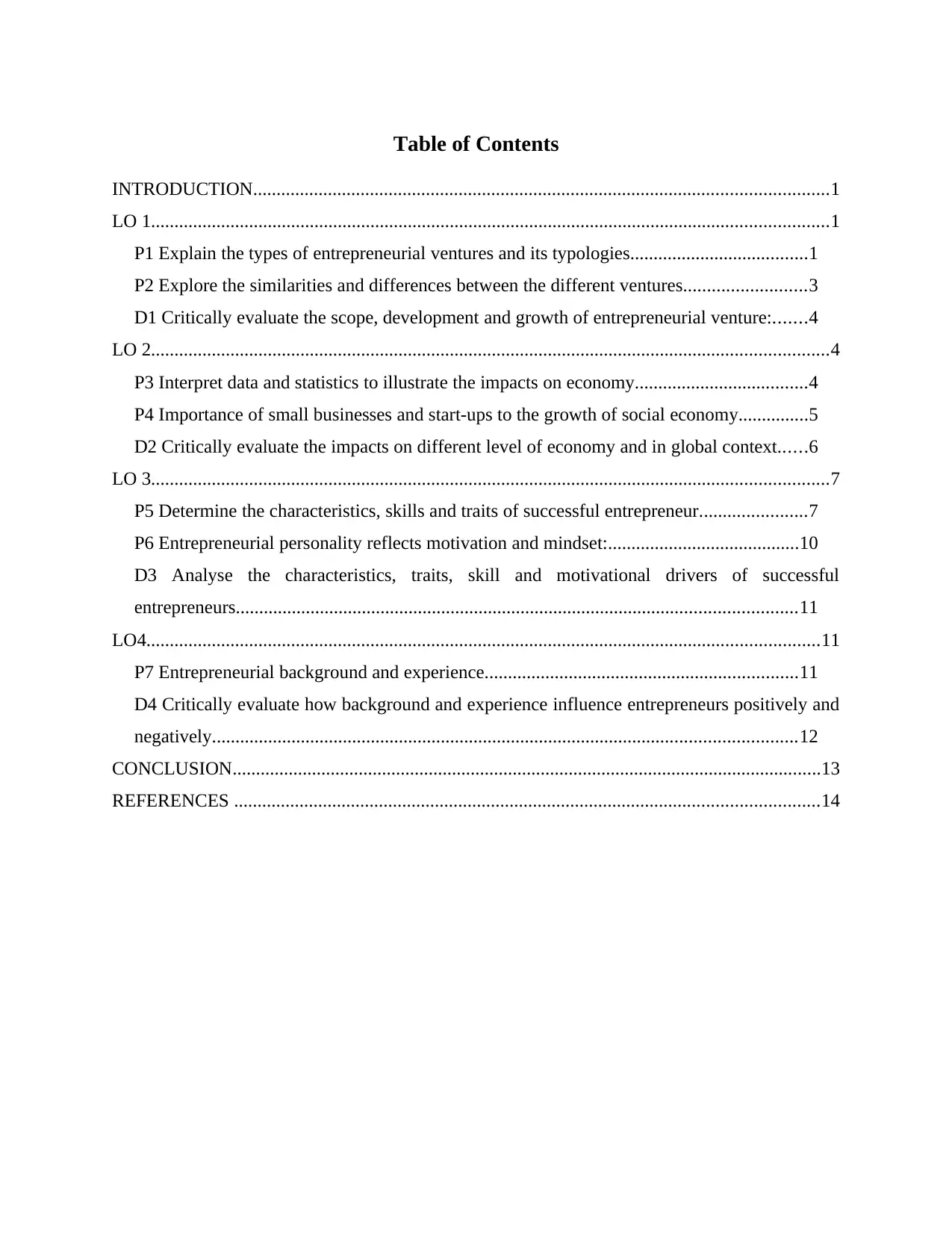
Table of Contents
INTRODUCTION...........................................................................................................................1
LO 1.................................................................................................................................................1
P1 Explain the types of entrepreneurial ventures and its typologies......................................1
P2 Explore the similarities and differences between the different ventures..........................3
D1 Critically evaluate the scope, development and growth of entrepreneurial venture:.......4
LO 2.................................................................................................................................................4
P3 Interpret data and statistics to illustrate the impacts on economy.....................................4
P4 Importance of small businesses and start-ups to the growth of social economy...............5
D2 Critically evaluate the impacts on different level of economy and in global context......6
LO 3.................................................................................................................................................7
P5 Determine the characteristics, skills and traits of successful entrepreneur.......................7
P6 Entrepreneurial personality reflects motivation and mindset:.........................................10
D3 Analyse the characteristics, traits, skill and motivational drivers of successful
entrepreneurs........................................................................................................................11
LO4................................................................................................................................................11
P7 Entrepreneurial background and experience...................................................................11
D4 Critically evaluate how background and experience influence entrepreneurs positively and
negatively.............................................................................................................................12
CONCLUSION..............................................................................................................................13
REFERENCES .............................................................................................................................14
INTRODUCTION...........................................................................................................................1
LO 1.................................................................................................................................................1
P1 Explain the types of entrepreneurial ventures and its typologies......................................1
P2 Explore the similarities and differences between the different ventures..........................3
D1 Critically evaluate the scope, development and growth of entrepreneurial venture:.......4
LO 2.................................................................................................................................................4
P3 Interpret data and statistics to illustrate the impacts on economy.....................................4
P4 Importance of small businesses and start-ups to the growth of social economy...............5
D2 Critically evaluate the impacts on different level of economy and in global context......6
LO 3.................................................................................................................................................7
P5 Determine the characteristics, skills and traits of successful entrepreneur.......................7
P6 Entrepreneurial personality reflects motivation and mindset:.........................................10
D3 Analyse the characteristics, traits, skill and motivational drivers of successful
entrepreneurs........................................................................................................................11
LO4................................................................................................................................................11
P7 Entrepreneurial background and experience...................................................................11
D4 Critically evaluate how background and experience influence entrepreneurs positively and
negatively.............................................................................................................................12
CONCLUSION..............................................................................................................................13
REFERENCES .............................................................................................................................14
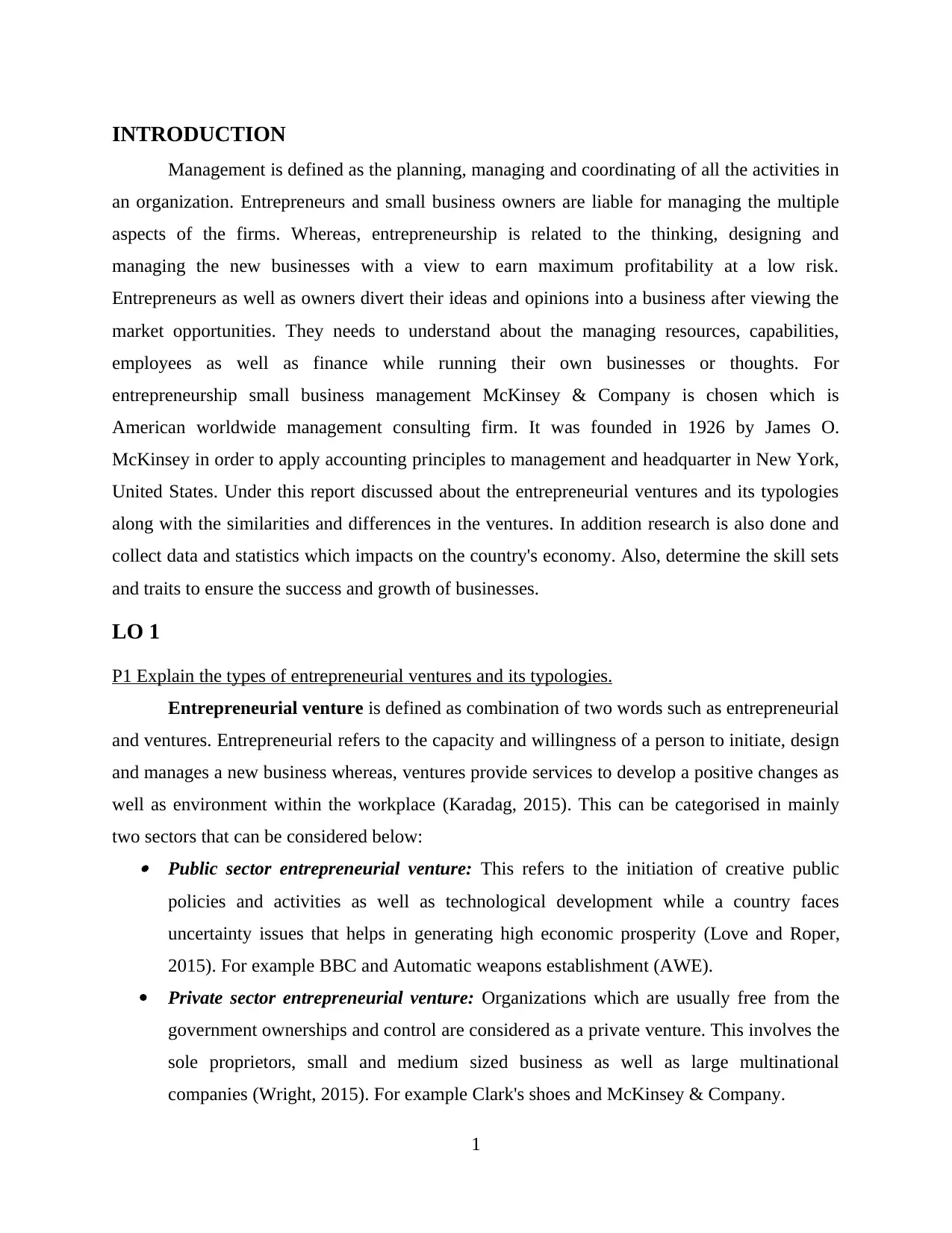
INTRODUCTION
Management is defined as the planning, managing and coordinating of all the activities in
an organization. Entrepreneurs and small business owners are liable for managing the multiple
aspects of the firms. Whereas, entrepreneurship is related to the thinking, designing and
managing the new businesses with a view to earn maximum profitability at a low risk.
Entrepreneurs as well as owners divert their ideas and opinions into a business after viewing the
market opportunities. They needs to understand about the managing resources, capabilities,
employees as well as finance while running their own businesses or thoughts. For
entrepreneurship small business management McKinsey & Company is chosen which is
American worldwide management consulting firm. It was founded in 1926 by James O.
McKinsey in order to apply accounting principles to management and headquarter in New York,
United States. Under this report discussed about the entrepreneurial ventures and its typologies
along with the similarities and differences in the ventures. In addition research is also done and
collect data and statistics which impacts on the country's economy. Also, determine the skill sets
and traits to ensure the success and growth of businesses.
LO 1
P1 Explain the types of entrepreneurial ventures and its typologies.
Entrepreneurial venture is defined as combination of two words such as entrepreneurial
and ventures. Entrepreneurial refers to the capacity and willingness of a person to initiate, design
and manages a new business whereas, ventures provide services to develop a positive changes as
well as environment within the workplace (Karadag, 2015). This can be categorised in mainly
two sectors that can be considered below: Public sector entrepreneurial venture: This refers to the initiation of creative public
policies and activities as well as technological development while a country faces
uncertainty issues that helps in generating high economic prosperity (Love and Roper,
2015). For example BBC and Automatic weapons establishment (AWE).
Private sector entrepreneurial venture: Organizations which are usually free from the
government ownerships and control are considered as a private venture. This involves the
sole proprietors, small and medium sized business as well as large multinational
companies (Wright, 2015). For example Clark's shoes and McKinsey & Company.
1
Management is defined as the planning, managing and coordinating of all the activities in
an organization. Entrepreneurs and small business owners are liable for managing the multiple
aspects of the firms. Whereas, entrepreneurship is related to the thinking, designing and
managing the new businesses with a view to earn maximum profitability at a low risk.
Entrepreneurs as well as owners divert their ideas and opinions into a business after viewing the
market opportunities. They needs to understand about the managing resources, capabilities,
employees as well as finance while running their own businesses or thoughts. For
entrepreneurship small business management McKinsey & Company is chosen which is
American worldwide management consulting firm. It was founded in 1926 by James O.
McKinsey in order to apply accounting principles to management and headquarter in New York,
United States. Under this report discussed about the entrepreneurial ventures and its typologies
along with the similarities and differences in the ventures. In addition research is also done and
collect data and statistics which impacts on the country's economy. Also, determine the skill sets
and traits to ensure the success and growth of businesses.
LO 1
P1 Explain the types of entrepreneurial ventures and its typologies.
Entrepreneurial venture is defined as combination of two words such as entrepreneurial
and ventures. Entrepreneurial refers to the capacity and willingness of a person to initiate, design
and manages a new business whereas, ventures provide services to develop a positive changes as
well as environment within the workplace (Karadag, 2015). This can be categorised in mainly
two sectors that can be considered below: Public sector entrepreneurial venture: This refers to the initiation of creative public
policies and activities as well as technological development while a country faces
uncertainty issues that helps in generating high economic prosperity (Love and Roper,
2015). For example BBC and Automatic weapons establishment (AWE).
Private sector entrepreneurial venture: Organizations which are usually free from the
government ownerships and control are considered as a private venture. This involves the
sole proprietors, small and medium sized business as well as large multinational
companies (Wright, 2015). For example Clark's shoes and McKinsey & Company.
1
⊘ This is a preview!⊘
Do you want full access?
Subscribe today to unlock all pages.

Trusted by 1+ million students worldwide
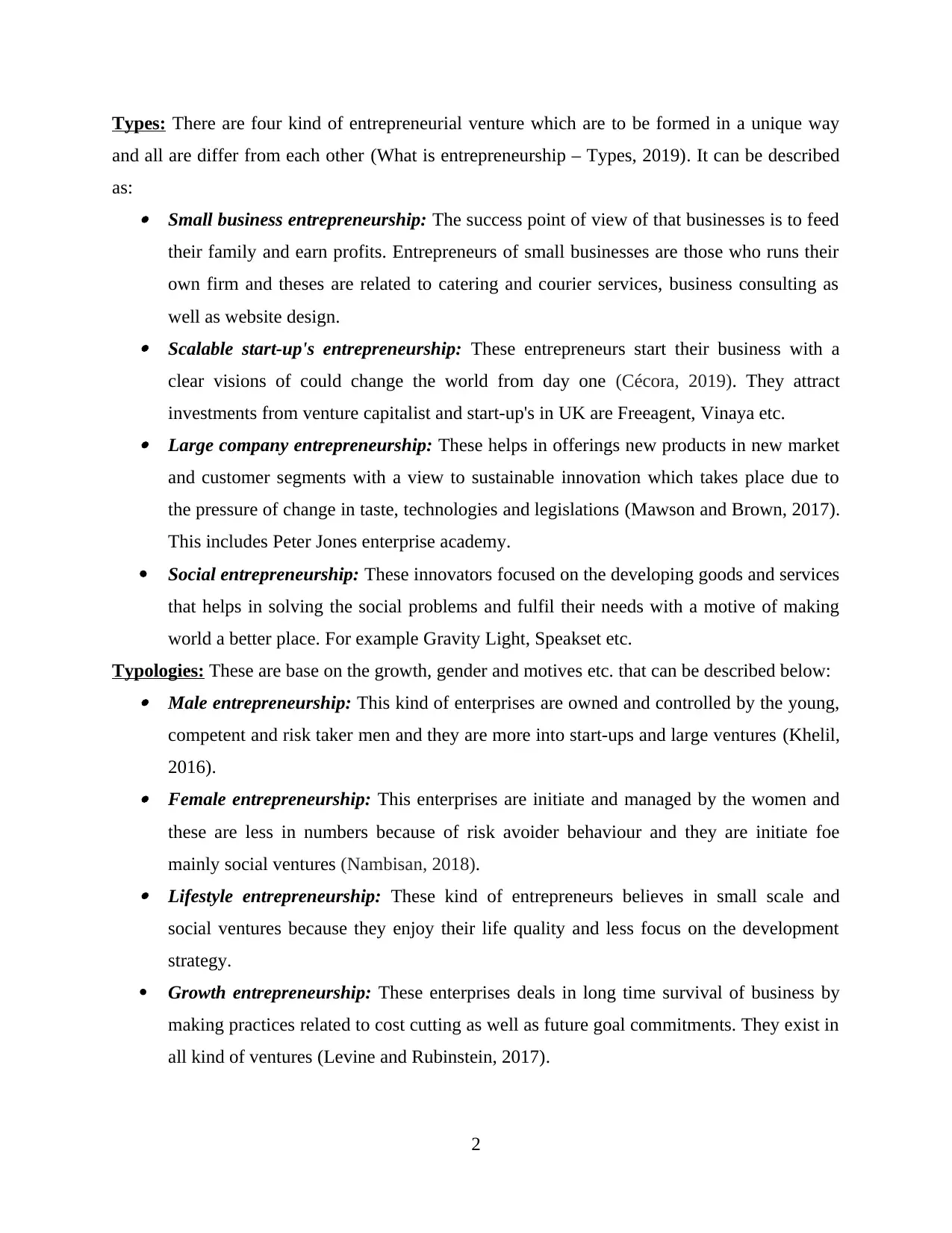
Types: There are four kind of entrepreneurial venture which are to be formed in a unique way
and all are differ from each other (What is entrepreneurship – Types, 2019). It can be described
as: Small business entrepreneurship: The success point of view of that businesses is to feed
their family and earn profits. Entrepreneurs of small businesses are those who runs their
own firm and theses are related to catering and courier services, business consulting as
well as website design. Scalable start-up's entrepreneurship: These entrepreneurs start their business with a
clear visions of could change the world from day one (Cécora, 2019). They attract
investments from venture capitalist and start-up's in UK are Freeagent, Vinaya etc. Large company entrepreneurship: These helps in offerings new products in new market
and customer segments with a view to sustainable innovation which takes place due to
the pressure of change in taste, technologies and legislations (Mawson and Brown, 2017).
This includes Peter Jones enterprise academy.
Social entrepreneurship: These innovators focused on the developing goods and services
that helps in solving the social problems and fulfil their needs with a motive of making
world a better place. For example Gravity Light, Speakset etc.
Typologies: These are base on the growth, gender and motives etc. that can be described below: Male entrepreneurship: This kind of enterprises are owned and controlled by the young,
competent and risk taker men and they are more into start-ups and large ventures (Khelil,
2016). Female entrepreneurship: This enterprises are initiate and managed by the women and
these are less in numbers because of risk avoider behaviour and they are initiate foe
mainly social ventures (Nambisan, 2018). Lifestyle entrepreneurship: These kind of entrepreneurs believes in small scale and
social ventures because they enjoy their life quality and less focus on the development
strategy.
Growth entrepreneurship: These enterprises deals in long time survival of business by
making practices related to cost cutting as well as future goal commitments. They exist in
all kind of ventures (Levine and Rubinstein, 2017).
2
and all are differ from each other (What is entrepreneurship – Types, 2019). It can be described
as: Small business entrepreneurship: The success point of view of that businesses is to feed
their family and earn profits. Entrepreneurs of small businesses are those who runs their
own firm and theses are related to catering and courier services, business consulting as
well as website design. Scalable start-up's entrepreneurship: These entrepreneurs start their business with a
clear visions of could change the world from day one (Cécora, 2019). They attract
investments from venture capitalist and start-up's in UK are Freeagent, Vinaya etc. Large company entrepreneurship: These helps in offerings new products in new market
and customer segments with a view to sustainable innovation which takes place due to
the pressure of change in taste, technologies and legislations (Mawson and Brown, 2017).
This includes Peter Jones enterprise academy.
Social entrepreneurship: These innovators focused on the developing goods and services
that helps in solving the social problems and fulfil their needs with a motive of making
world a better place. For example Gravity Light, Speakset etc.
Typologies: These are base on the growth, gender and motives etc. that can be described below: Male entrepreneurship: This kind of enterprises are owned and controlled by the young,
competent and risk taker men and they are more into start-ups and large ventures (Khelil,
2016). Female entrepreneurship: This enterprises are initiate and managed by the women and
these are less in numbers because of risk avoider behaviour and they are initiate foe
mainly social ventures (Nambisan, 2018). Lifestyle entrepreneurship: These kind of entrepreneurs believes in small scale and
social ventures because they enjoy their life quality and less focus on the development
strategy.
Growth entrepreneurship: These enterprises deals in long time survival of business by
making practices related to cost cutting as well as future goal commitments. They exist in
all kind of ventures (Levine and Rubinstein, 2017).
2
Paraphrase This Document
Need a fresh take? Get an instant paraphrase of this document with our AI Paraphraser
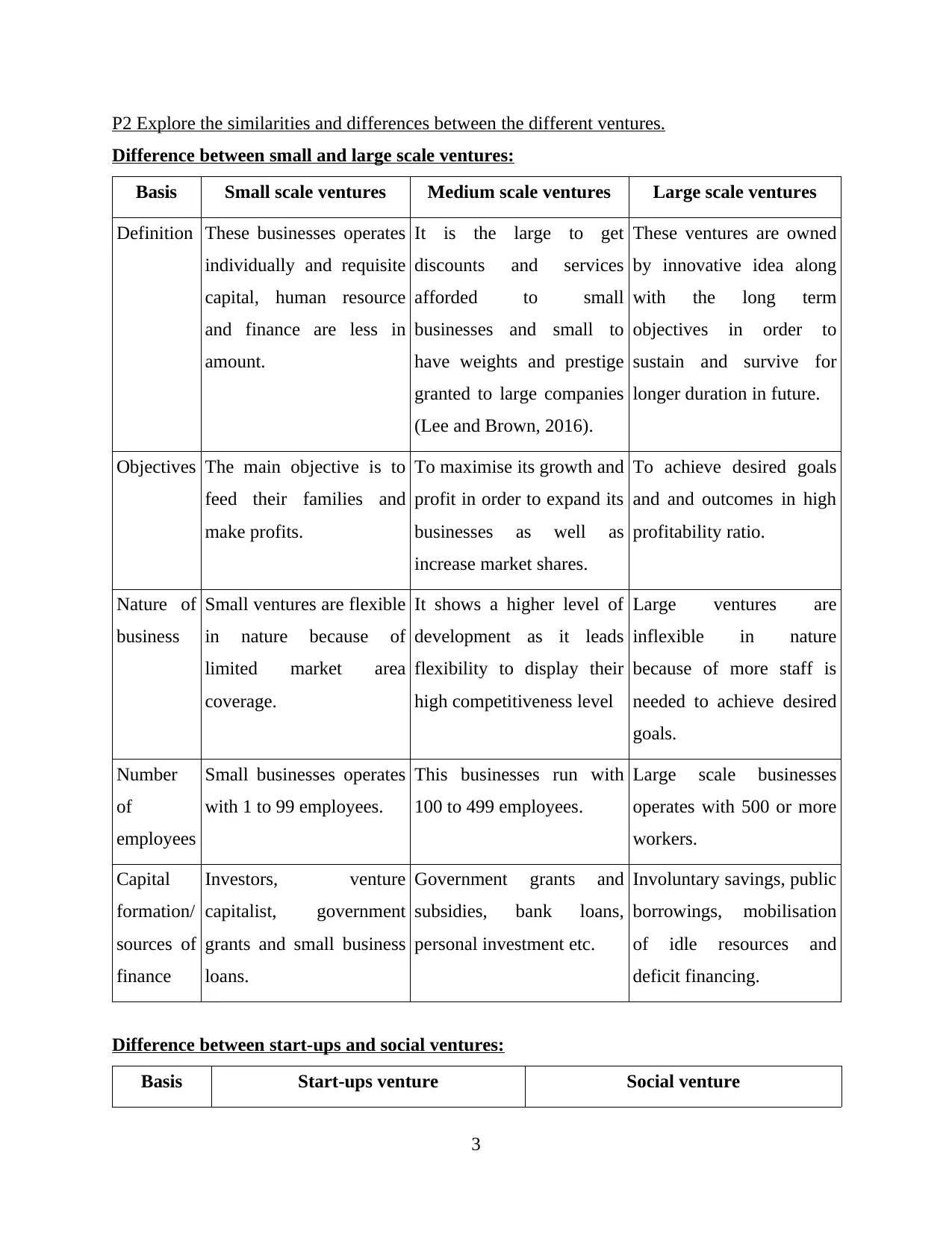
P2 Explore the similarities and differences between the different ventures.
Difference between small and large scale ventures:
Basis Small scale ventures Medium scale ventures Large scale ventures
Definition These businesses operates
individually and requisite
capital, human resource
and finance are less in
amount.
It is the large to get
discounts and services
afforded to small
businesses and small to
have weights and prestige
granted to large companies
(Lee and Brown, 2016).
These ventures are owned
by innovative idea along
with the long term
objectives in order to
sustain and survive for
longer duration in future.
Objectives The main objective is to
feed their families and
make profits.
To maximise its growth and
profit in order to expand its
businesses as well as
increase market shares.
To achieve desired goals
and and outcomes in high
profitability ratio.
Nature of
business
Small ventures are flexible
in nature because of
limited market area
coverage.
It shows a higher level of
development as it leads
flexibility to display their
high competitiveness level
Large ventures are
inflexible in nature
because of more staff is
needed to achieve desired
goals.
Number
of
employees
Small businesses operates
with 1 to 99 employees.
This businesses run with
100 to 499 employees.
Large scale businesses
operates with 500 or more
workers.
Capital
formation/
sources of
finance
Investors, venture
capitalist, government
grants and small business
loans.
Government grants and
subsidies, bank loans,
personal investment etc.
Involuntary savings, public
borrowings, mobilisation
of idle resources and
deficit financing.
Difference between start-ups and social ventures:
Basis Start-ups venture Social venture
3
Difference between small and large scale ventures:
Basis Small scale ventures Medium scale ventures Large scale ventures
Definition These businesses operates
individually and requisite
capital, human resource
and finance are less in
amount.
It is the large to get
discounts and services
afforded to small
businesses and small to
have weights and prestige
granted to large companies
(Lee and Brown, 2016).
These ventures are owned
by innovative idea along
with the long term
objectives in order to
sustain and survive for
longer duration in future.
Objectives The main objective is to
feed their families and
make profits.
To maximise its growth and
profit in order to expand its
businesses as well as
increase market shares.
To achieve desired goals
and and outcomes in high
profitability ratio.
Nature of
business
Small ventures are flexible
in nature because of
limited market area
coverage.
It shows a higher level of
development as it leads
flexibility to display their
high competitiveness level
Large ventures are
inflexible in nature
because of more staff is
needed to achieve desired
goals.
Number
of
employees
Small businesses operates
with 1 to 99 employees.
This businesses run with
100 to 499 employees.
Large scale businesses
operates with 500 or more
workers.
Capital
formation/
sources of
finance
Investors, venture
capitalist, government
grants and small business
loans.
Government grants and
subsidies, bank loans,
personal investment etc.
Involuntary savings, public
borrowings, mobilisation
of idle resources and
deficit financing.
Difference between start-ups and social ventures:
Basis Start-ups venture Social venture
3
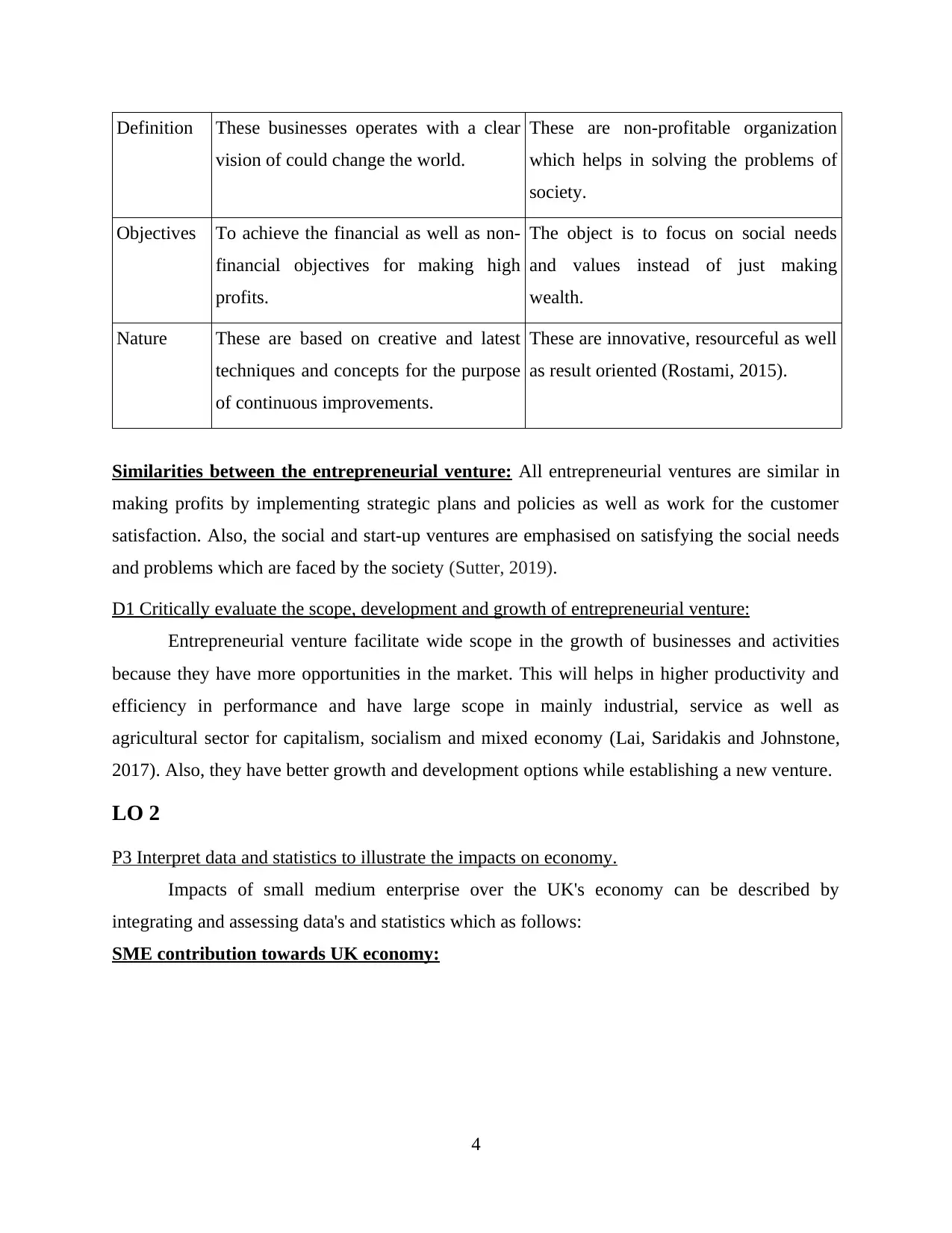
Definition These businesses operates with a clear
vision of could change the world.
These are non-profitable organization
which helps in solving the problems of
society.
Objectives To achieve the financial as well as non-
financial objectives for making high
profits.
The object is to focus on social needs
and values instead of just making
wealth.
Nature These are based on creative and latest
techniques and concepts for the purpose
of continuous improvements.
These are innovative, resourceful as well
as result oriented (Rostami, 2015).
Similarities between the entrepreneurial venture: All entrepreneurial ventures are similar in
making profits by implementing strategic plans and policies as well as work for the customer
satisfaction. Also, the social and start-up ventures are emphasised on satisfying the social needs
and problems which are faced by the society (Sutter, 2019).
D1 Critically evaluate the scope, development and growth of entrepreneurial venture:
Entrepreneurial venture facilitate wide scope in the growth of businesses and activities
because they have more opportunities in the market. This will helps in higher productivity and
efficiency in performance and have large scope in mainly industrial, service as well as
agricultural sector for capitalism, socialism and mixed economy (Lai, Saridakis and Johnstone,
2017). Also, they have better growth and development options while establishing a new venture.
LO 2
P3 Interpret data and statistics to illustrate the impacts on economy.
Impacts of small medium enterprise over the UK's economy can be described by
integrating and assessing data's and statistics which as follows:
SME contribution towards UK economy:
4
vision of could change the world.
These are non-profitable organization
which helps in solving the problems of
society.
Objectives To achieve the financial as well as non-
financial objectives for making high
profits.
The object is to focus on social needs
and values instead of just making
wealth.
Nature These are based on creative and latest
techniques and concepts for the purpose
of continuous improvements.
These are innovative, resourceful as well
as result oriented (Rostami, 2015).
Similarities between the entrepreneurial venture: All entrepreneurial ventures are similar in
making profits by implementing strategic plans and policies as well as work for the customer
satisfaction. Also, the social and start-up ventures are emphasised on satisfying the social needs
and problems which are faced by the society (Sutter, 2019).
D1 Critically evaluate the scope, development and growth of entrepreneurial venture:
Entrepreneurial venture facilitate wide scope in the growth of businesses and activities
because they have more opportunities in the market. This will helps in higher productivity and
efficiency in performance and have large scope in mainly industrial, service as well as
agricultural sector for capitalism, socialism and mixed economy (Lai, Saridakis and Johnstone,
2017). Also, they have better growth and development options while establishing a new venture.
LO 2
P3 Interpret data and statistics to illustrate the impacts on economy.
Impacts of small medium enterprise over the UK's economy can be described by
integrating and assessing data's and statistics which as follows:
SME contribution towards UK economy:
4
⊘ This is a preview!⊘
Do you want full access?
Subscribe today to unlock all pages.

Trusted by 1+ million students worldwide
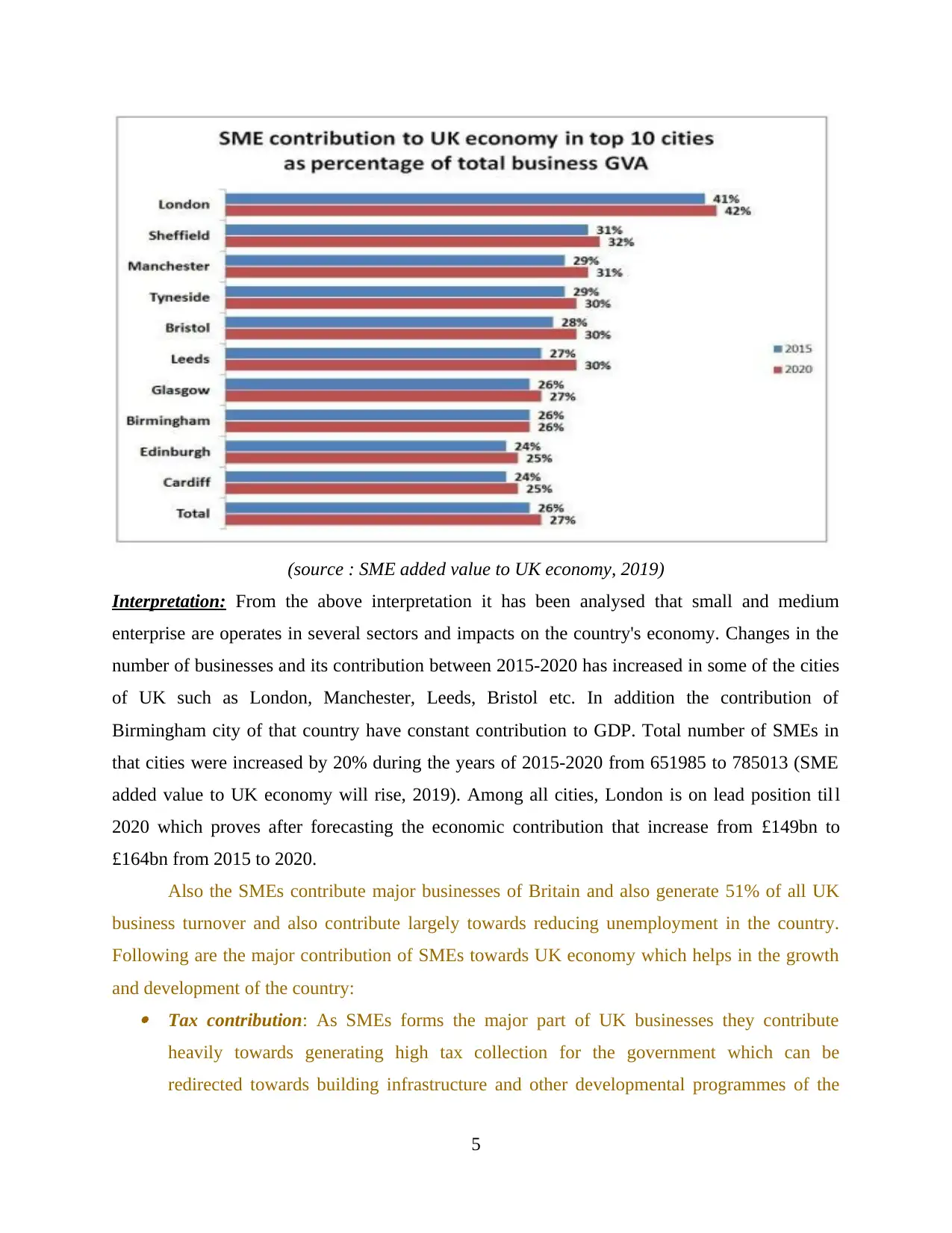
(source : SME added value to UK economy, 2019)
Interpretation: From the above interpretation it has been analysed that small and medium
enterprise are operates in several sectors and impacts on the country's economy. Changes in the
number of businesses and its contribution between 2015-2020 has increased in some of the cities
of UK such as London, Manchester, Leeds, Bristol etc. In addition the contribution of
Birmingham city of that country have constant contribution to GDP. Total number of SMEs in
that cities were increased by 20% during the years of 2015-2020 from 651985 to 785013 (SME
added value to UK economy will rise, 2019). Among all cities, London is on lead position til l
2020 which proves after forecasting the economic contribution that increase from £149bn to
£164bn from 2015 to 2020.
Also the SMEs contribute major businesses of Britain and also generate 51% of all UK
business turnover and also contribute largely towards reducing unemployment in the country.
Following are the major contribution of SMEs towards UK economy which helps in the growth
and development of the country: Tax contribution: As SMEs forms the major part of UK businesses they contribute
heavily towards generating high tax collection for the government which can be
redirected towards building infrastructure and other developmental programmes of the
5
Interpretation: From the above interpretation it has been analysed that small and medium
enterprise are operates in several sectors and impacts on the country's economy. Changes in the
number of businesses and its contribution between 2015-2020 has increased in some of the cities
of UK such as London, Manchester, Leeds, Bristol etc. In addition the contribution of
Birmingham city of that country have constant contribution to GDP. Total number of SMEs in
that cities were increased by 20% during the years of 2015-2020 from 651985 to 785013 (SME
added value to UK economy will rise, 2019). Among all cities, London is on lead position til l
2020 which proves after forecasting the economic contribution that increase from £149bn to
£164bn from 2015 to 2020.
Also the SMEs contribute major businesses of Britain and also generate 51% of all UK
business turnover and also contribute largely towards reducing unemployment in the country.
Following are the major contribution of SMEs towards UK economy which helps in the growth
and development of the country: Tax contribution: As SMEs forms the major part of UK businesses they contribute
heavily towards generating high tax collection for the government which can be
redirected towards building infrastructure and other developmental programmes of the
5
Paraphrase This Document
Need a fresh take? Get an instant paraphrase of this document with our AI Paraphraser
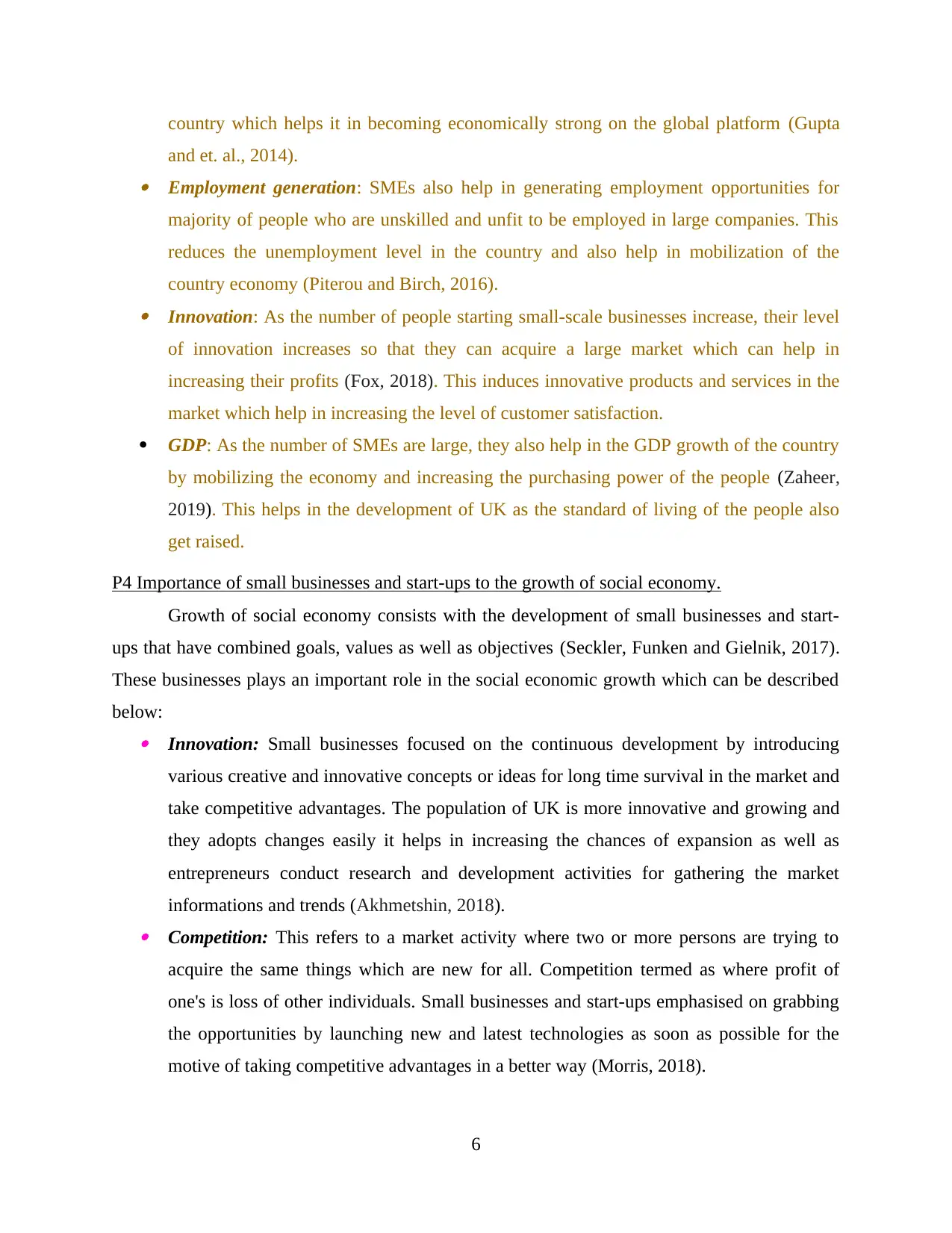
country which helps it in becoming economically strong on the global platform (Gupta
and et. al., 2014). Employment generation: SMEs also help in generating employment opportunities for
majority of people who are unskilled and unfit to be employed in large companies. This
reduces the unemployment level in the country and also help in mobilization of the
country economy (Piterou and Birch, 2016). Innovation: As the number of people starting small-scale businesses increase, their level
of innovation increases so that they can acquire a large market which can help in
increasing their profits (Fox, 2018). This induces innovative products and services in the
market which help in increasing the level of customer satisfaction.
GDP: As the number of SMEs are large, they also help in the GDP growth of the country
by mobilizing the economy and increasing the purchasing power of the people (Zaheer,
2019). This helps in the development of UK as the standard of living of the people also
get raised.
P4 Importance of small businesses and start-ups to the growth of social economy.
Growth of social economy consists with the development of small businesses and start-
ups that have combined goals, values as well as objectives (Seckler, Funken and Gielnik, 2017).
These businesses plays an important role in the social economic growth which can be described
below: Innovation: Small businesses focused on the continuous development by introducing
various creative and innovative concepts or ideas for long time survival in the market and
take competitive advantages. The population of UK is more innovative and growing and
they adopts changes easily it helps in increasing the chances of expansion as well as
entrepreneurs conduct research and development activities for gathering the market
informations and trends (Akhmetshin, 2018). Competition: This refers to a market activity where two or more persons are trying to
acquire the same things which are new for all. Competition termed as where profit of
one's is loss of other individuals. Small businesses and start-ups emphasised on grabbing
the opportunities by launching new and latest technologies as soon as possible for the
motive of taking competitive advantages in a better way (Morris, 2018).
6
and et. al., 2014). Employment generation: SMEs also help in generating employment opportunities for
majority of people who are unskilled and unfit to be employed in large companies. This
reduces the unemployment level in the country and also help in mobilization of the
country economy (Piterou and Birch, 2016). Innovation: As the number of people starting small-scale businesses increase, their level
of innovation increases so that they can acquire a large market which can help in
increasing their profits (Fox, 2018). This induces innovative products and services in the
market which help in increasing the level of customer satisfaction.
GDP: As the number of SMEs are large, they also help in the GDP growth of the country
by mobilizing the economy and increasing the purchasing power of the people (Zaheer,
2019). This helps in the development of UK as the standard of living of the people also
get raised.
P4 Importance of small businesses and start-ups to the growth of social economy.
Growth of social economy consists with the development of small businesses and start-
ups that have combined goals, values as well as objectives (Seckler, Funken and Gielnik, 2017).
These businesses plays an important role in the social economic growth which can be described
below: Innovation: Small businesses focused on the continuous development by introducing
various creative and innovative concepts or ideas for long time survival in the market and
take competitive advantages. The population of UK is more innovative and growing and
they adopts changes easily it helps in increasing the chances of expansion as well as
entrepreneurs conduct research and development activities for gathering the market
informations and trends (Akhmetshin, 2018). Competition: This refers to a market activity where two or more persons are trying to
acquire the same things which are new for all. Competition termed as where profit of
one's is loss of other individuals. Small businesses and start-ups emphasised on grabbing
the opportunities by launching new and latest technologies as soon as possible for the
motive of taking competitive advantages in a better way (Morris, 2018).
6
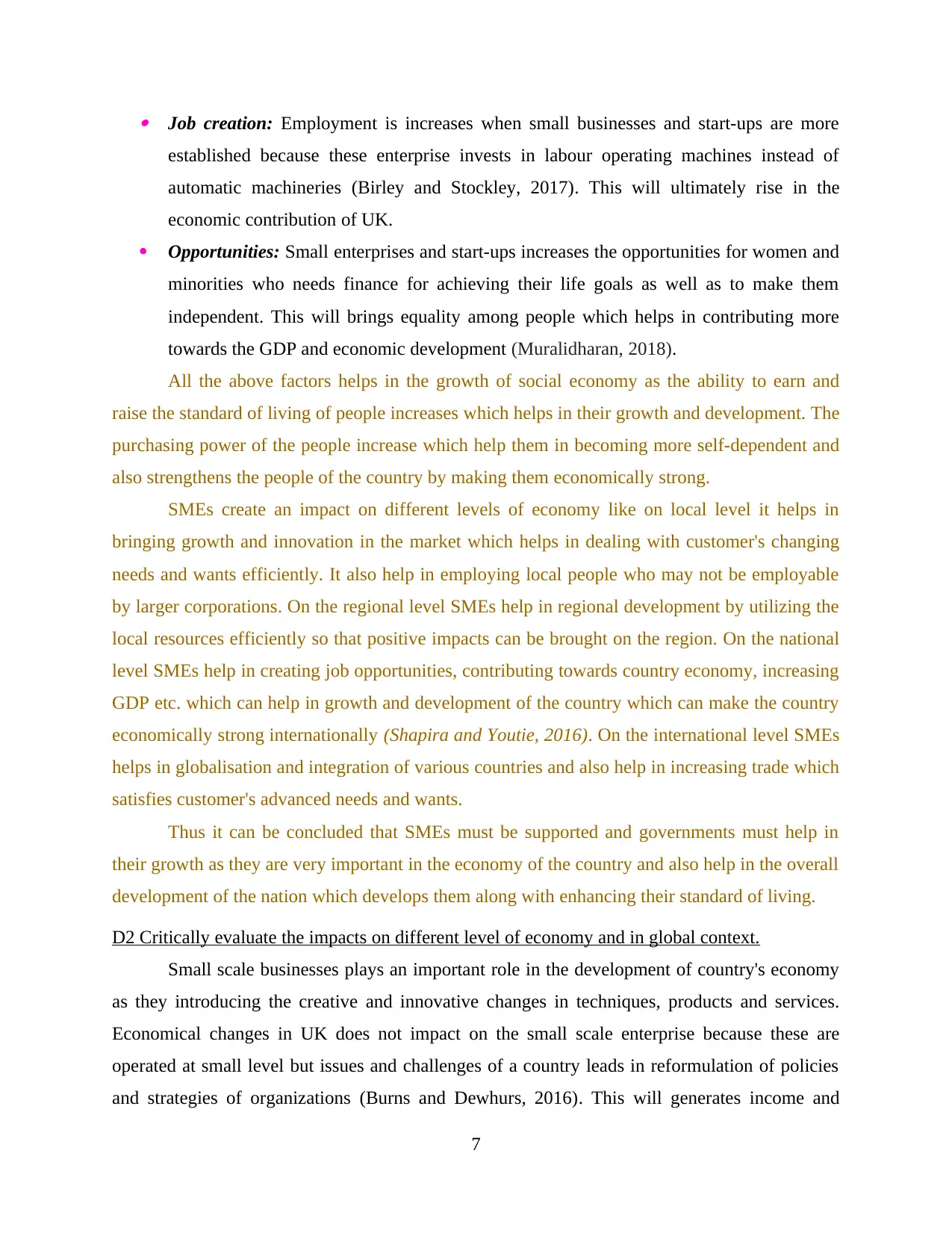
Job creation: Employment is increases when small businesses and start-ups are more
established because these enterprise invests in labour operating machines instead of
automatic machineries (Birley and Stockley, 2017). This will ultimately rise in the
economic contribution of UK.
Opportunities: Small enterprises and start-ups increases the opportunities for women and
minorities who needs finance for achieving their life goals as well as to make them
independent. This will brings equality among people which helps in contributing more
towards the GDP and economic development (Muralidharan, 2018).
All the above factors helps in the growth of social economy as the ability to earn and
raise the standard of living of people increases which helps in their growth and development. The
purchasing power of the people increase which help them in becoming more self-dependent and
also strengthens the people of the country by making them economically strong.
SMEs create an impact on different levels of economy like on local level it helps in
bringing growth and innovation in the market which helps in dealing with customer's changing
needs and wants efficiently. It also help in employing local people who may not be employable
by larger corporations. On the regional level SMEs help in regional development by utilizing the
local resources efficiently so that positive impacts can be brought on the region. On the national
level SMEs help in creating job opportunities, contributing towards country economy, increasing
GDP etc. which can help in growth and development of the country which can make the country
economically strong internationally (Shapira and Youtie, 2016). On the international level SMEs
helps in globalisation and integration of various countries and also help in increasing trade which
satisfies customer's advanced needs and wants.
Thus it can be concluded that SMEs must be supported and governments must help in
their growth as they are very important in the economy of the country and also help in the overall
development of the nation which develops them along with enhancing their standard of living.
D2 Critically evaluate the impacts on different level of economy and in global context.
Small scale businesses plays an important role in the development of country's economy
as they introducing the creative and innovative changes in techniques, products and services.
Economical changes in UK does not impact on the small scale enterprise because these are
operated at small level but issues and challenges of a country leads in reformulation of policies
and strategies of organizations (Burns and Dewhurs, 2016). This will generates income and
7
established because these enterprise invests in labour operating machines instead of
automatic machineries (Birley and Stockley, 2017). This will ultimately rise in the
economic contribution of UK.
Opportunities: Small enterprises and start-ups increases the opportunities for women and
minorities who needs finance for achieving their life goals as well as to make them
independent. This will brings equality among people which helps in contributing more
towards the GDP and economic development (Muralidharan, 2018).
All the above factors helps in the growth of social economy as the ability to earn and
raise the standard of living of people increases which helps in their growth and development. The
purchasing power of the people increase which help them in becoming more self-dependent and
also strengthens the people of the country by making them economically strong.
SMEs create an impact on different levels of economy like on local level it helps in
bringing growth and innovation in the market which helps in dealing with customer's changing
needs and wants efficiently. It also help in employing local people who may not be employable
by larger corporations. On the regional level SMEs help in regional development by utilizing the
local resources efficiently so that positive impacts can be brought on the region. On the national
level SMEs help in creating job opportunities, contributing towards country economy, increasing
GDP etc. which can help in growth and development of the country which can make the country
economically strong internationally (Shapira and Youtie, 2016). On the international level SMEs
helps in globalisation and integration of various countries and also help in increasing trade which
satisfies customer's advanced needs and wants.
Thus it can be concluded that SMEs must be supported and governments must help in
their growth as they are very important in the economy of the country and also help in the overall
development of the nation which develops them along with enhancing their standard of living.
D2 Critically evaluate the impacts on different level of economy and in global context.
Small scale businesses plays an important role in the development of country's economy
as they introducing the creative and innovative changes in techniques, products and services.
Economical changes in UK does not impact on the small scale enterprise because these are
operated at small level but issues and challenges of a country leads in reformulation of policies
and strategies of organizations (Burns and Dewhurs, 2016). This will generates income and
7
⊘ This is a preview!⊘
Do you want full access?
Subscribe today to unlock all pages.

Trusted by 1+ million students worldwide
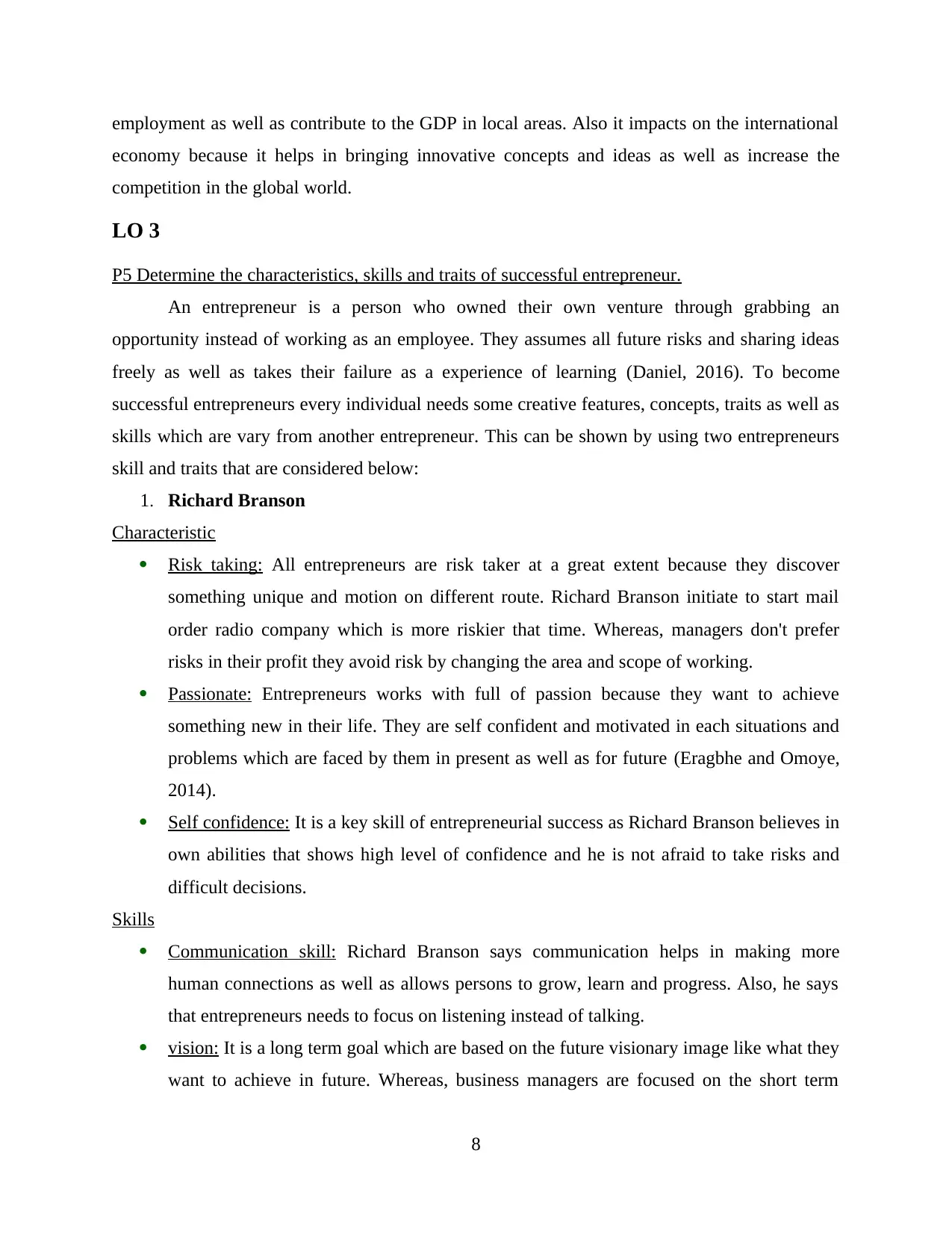
employment as well as contribute to the GDP in local areas. Also it impacts on the international
economy because it helps in bringing innovative concepts and ideas as well as increase the
competition in the global world.
LO 3
P5 Determine the characteristics, skills and traits of successful entrepreneur.
An entrepreneur is a person who owned their own venture through grabbing an
opportunity instead of working as an employee. They assumes all future risks and sharing ideas
freely as well as takes their failure as a experience of learning (Daniel, 2016). To become
successful entrepreneurs every individual needs some creative features, concepts, traits as well as
skills which are vary from another entrepreneur. This can be shown by using two entrepreneurs
skill and traits that are considered below:
1. Richard Branson
Characteristic
Risk taking: All entrepreneurs are risk taker at a great extent because they discover
something unique and motion on different route. Richard Branson initiate to start mail
order radio company which is more riskier that time. Whereas, managers don't prefer
risks in their profit they avoid risk by changing the area and scope of working.
Passionate: Entrepreneurs works with full of passion because they want to achieve
something new in their life. They are self confident and motivated in each situations and
problems which are faced by them in present as well as for future (Eragbhe and Omoye,
2014).
Self confidence: It is a key skill of entrepreneurial success as Richard Branson believes in
own abilities that shows high level of confidence and he is not afraid to take risks and
difficult decisions.
Skills
Communication skill: Richard Branson says communication helps in making more
human connections as well as allows persons to grow, learn and progress. Also, he says
that entrepreneurs needs to focus on listening instead of talking.
vision: It is a long term goal which are based on the future visionary image like what they
want to achieve in future. Whereas, business managers are focused on the short term
8
economy because it helps in bringing innovative concepts and ideas as well as increase the
competition in the global world.
LO 3
P5 Determine the characteristics, skills and traits of successful entrepreneur.
An entrepreneur is a person who owned their own venture through grabbing an
opportunity instead of working as an employee. They assumes all future risks and sharing ideas
freely as well as takes their failure as a experience of learning (Daniel, 2016). To become
successful entrepreneurs every individual needs some creative features, concepts, traits as well as
skills which are vary from another entrepreneur. This can be shown by using two entrepreneurs
skill and traits that are considered below:
1. Richard Branson
Characteristic
Risk taking: All entrepreneurs are risk taker at a great extent because they discover
something unique and motion on different route. Richard Branson initiate to start mail
order radio company which is more riskier that time. Whereas, managers don't prefer
risks in their profit they avoid risk by changing the area and scope of working.
Passionate: Entrepreneurs works with full of passion because they want to achieve
something new in their life. They are self confident and motivated in each situations and
problems which are faced by them in present as well as for future (Eragbhe and Omoye,
2014).
Self confidence: It is a key skill of entrepreneurial success as Richard Branson believes in
own abilities that shows high level of confidence and he is not afraid to take risks and
difficult decisions.
Skills
Communication skill: Richard Branson says communication helps in making more
human connections as well as allows persons to grow, learn and progress. Also, he says
that entrepreneurs needs to focus on listening instead of talking.
vision: It is a long term goal which are based on the future visionary image like what they
want to achieve in future. Whereas, business managers are focused on the short term
8
Paraphrase This Document
Need a fresh take? Get an instant paraphrase of this document with our AI Paraphraser
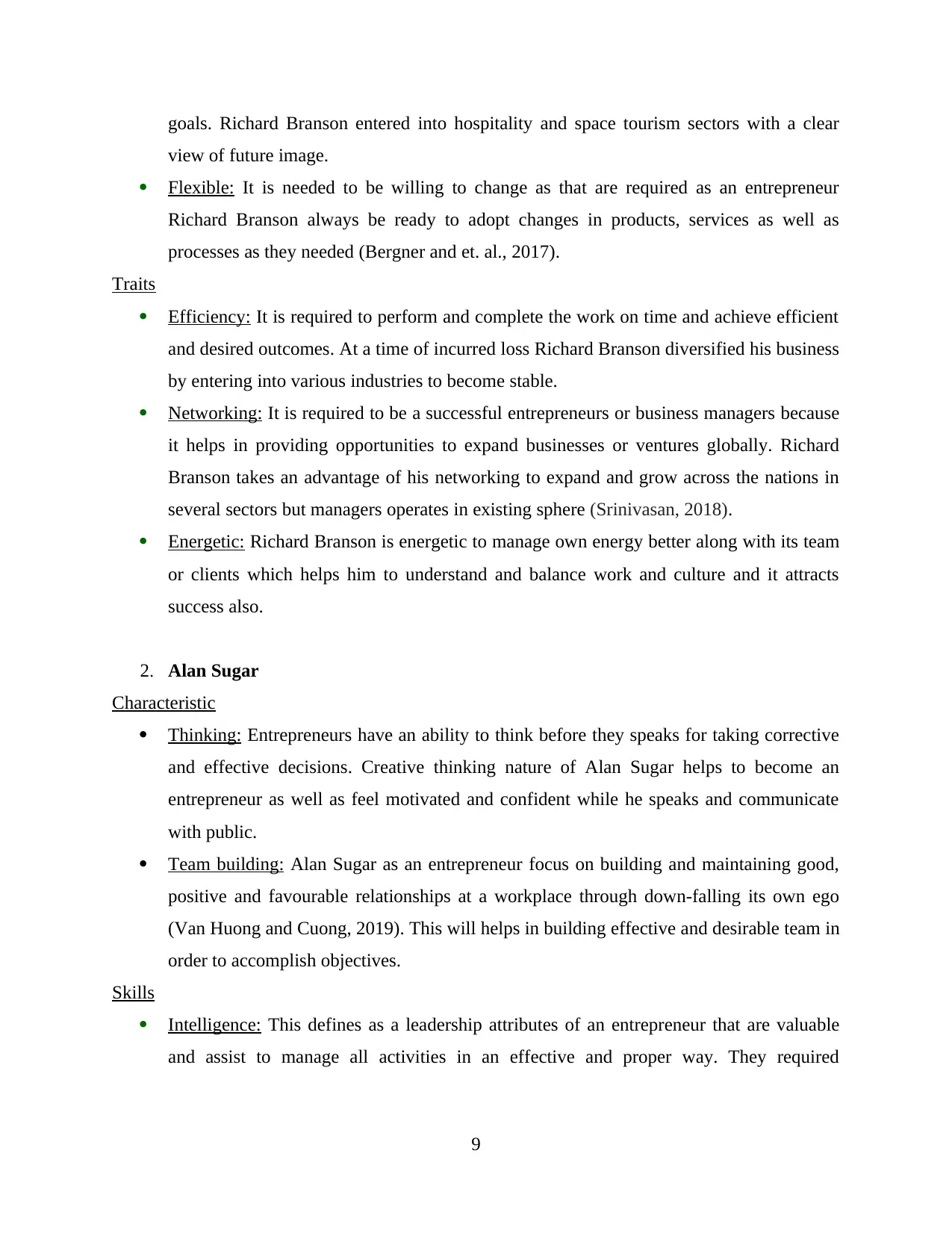
goals. Richard Branson entered into hospitality and space tourism sectors with a clear
view of future image.
Flexible: It is needed to be willing to change as that are required as an entrepreneur
Richard Branson always be ready to adopt changes in products, services as well as
processes as they needed (Bergner and et. al., 2017).
Traits
Efficiency: It is required to perform and complete the work on time and achieve efficient
and desired outcomes. At a time of incurred loss Richard Branson diversified his business
by entering into various industries to become stable.
Networking: It is required to be a successful entrepreneurs or business managers because
it helps in providing opportunities to expand businesses or ventures globally. Richard
Branson takes an advantage of his networking to expand and grow across the nations in
several sectors but managers operates in existing sphere (Srinivasan, 2018).
Energetic: Richard Branson is energetic to manage own energy better along with its team
or clients which helps him to understand and balance work and culture and it attracts
success also.
2. Alan Sugar
Characteristic
Thinking: Entrepreneurs have an ability to think before they speaks for taking corrective
and effective decisions. Creative thinking nature of Alan Sugar helps to become an
entrepreneur as well as feel motivated and confident while he speaks and communicate
with public.
Team building: Alan Sugar as an entrepreneur focus on building and maintaining good,
positive and favourable relationships at a workplace through down-falling its own ego
(Van Huong and Cuong, 2019). This will helps in building effective and desirable team in
order to accomplish objectives.
Skills
Intelligence: This defines as a leadership attributes of an entrepreneur that are valuable
and assist to manage all activities in an effective and proper way. They required
9
view of future image.
Flexible: It is needed to be willing to change as that are required as an entrepreneur
Richard Branson always be ready to adopt changes in products, services as well as
processes as they needed (Bergner and et. al., 2017).
Traits
Efficiency: It is required to perform and complete the work on time and achieve efficient
and desired outcomes. At a time of incurred loss Richard Branson diversified his business
by entering into various industries to become stable.
Networking: It is required to be a successful entrepreneurs or business managers because
it helps in providing opportunities to expand businesses or ventures globally. Richard
Branson takes an advantage of his networking to expand and grow across the nations in
several sectors but managers operates in existing sphere (Srinivasan, 2018).
Energetic: Richard Branson is energetic to manage own energy better along with its team
or clients which helps him to understand and balance work and culture and it attracts
success also.
2. Alan Sugar
Characteristic
Thinking: Entrepreneurs have an ability to think before they speaks for taking corrective
and effective decisions. Creative thinking nature of Alan Sugar helps to become an
entrepreneur as well as feel motivated and confident while he speaks and communicate
with public.
Team building: Alan Sugar as an entrepreneur focus on building and maintaining good,
positive and favourable relationships at a workplace through down-falling its own ego
(Van Huong and Cuong, 2019). This will helps in building effective and desirable team in
order to accomplish objectives.
Skills
Intelligence: This defines as a leadership attributes of an entrepreneur that are valuable
and assist to manage all activities in an effective and proper way. They required
9
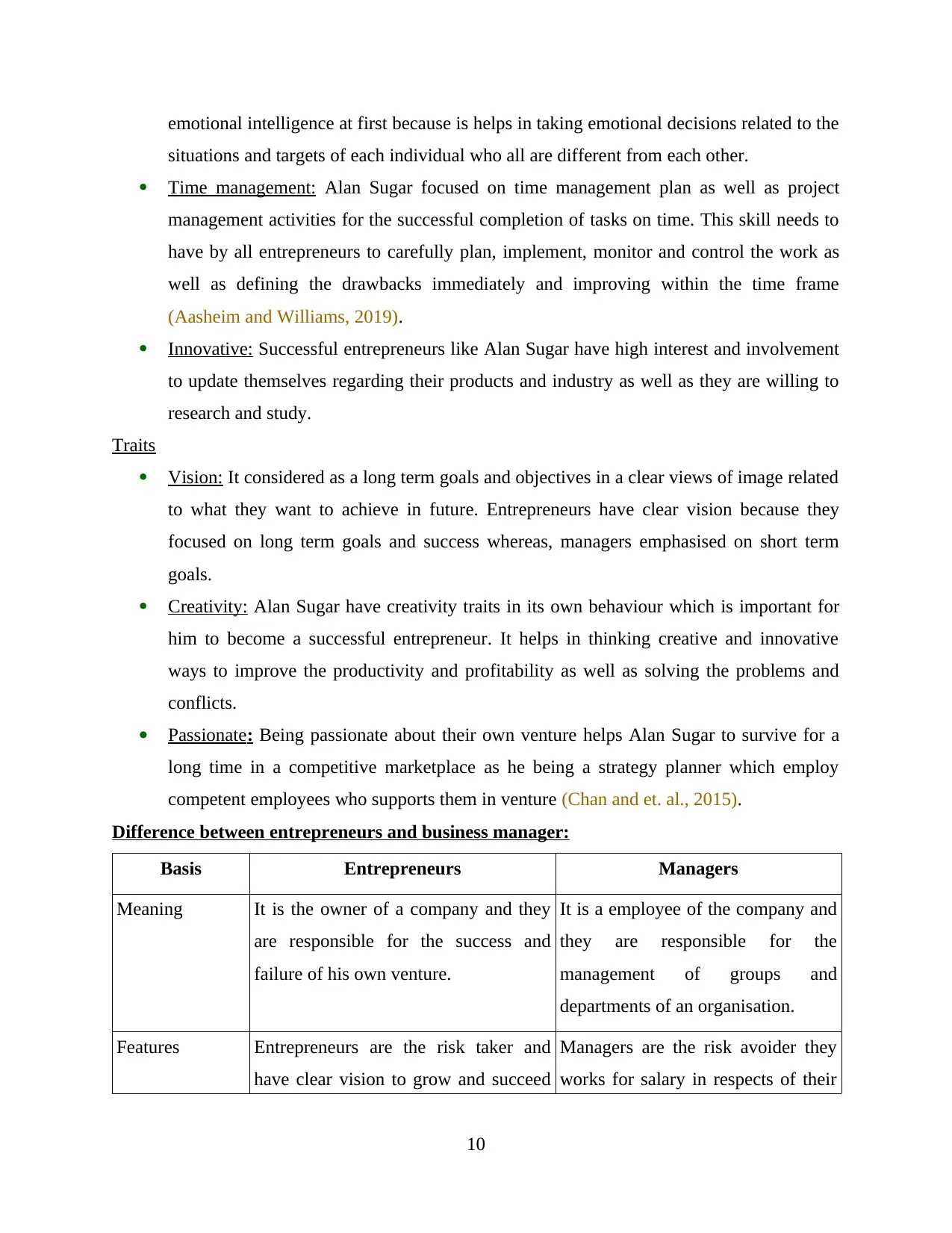
emotional intelligence at first because is helps in taking emotional decisions related to the
situations and targets of each individual who all are different from each other.
Time management: Alan Sugar focused on time management plan as well as project
management activities for the successful completion of tasks on time. This skill needs to
have by all entrepreneurs to carefully plan, implement, monitor and control the work as
well as defining the drawbacks immediately and improving within the time frame
(Aasheim and Williams, 2019).
Innovative: Successful entrepreneurs like Alan Sugar have high interest and involvement
to update themselves regarding their products and industry as well as they are willing to
research and study.
Traits
Vision: It considered as a long term goals and objectives in a clear views of image related
to what they want to achieve in future. Entrepreneurs have clear vision because they
focused on long term goals and success whereas, managers emphasised on short term
goals.
Creativity: Alan Sugar have creativity traits in its own behaviour which is important for
him to become a successful entrepreneur. It helps in thinking creative and innovative
ways to improve the productivity and profitability as well as solving the problems and
conflicts.
Passionate: Being passionate about their own venture helps Alan Sugar to survive for a
long time in a competitive marketplace as he being a strategy planner which employ
competent employees who supports them in venture (Chan and et. al., 2015).
Difference between entrepreneurs and business manager:
Basis Entrepreneurs Managers
Meaning It is the owner of a company and they
are responsible for the success and
failure of his own venture.
It is a employee of the company and
they are responsible for the
management of groups and
departments of an organisation.
Features Entrepreneurs are the risk taker and
have clear vision to grow and succeed
Managers are the risk avoider they
works for salary in respects of their
10
situations and targets of each individual who all are different from each other.
Time management: Alan Sugar focused on time management plan as well as project
management activities for the successful completion of tasks on time. This skill needs to
have by all entrepreneurs to carefully plan, implement, monitor and control the work as
well as defining the drawbacks immediately and improving within the time frame
(Aasheim and Williams, 2019).
Innovative: Successful entrepreneurs like Alan Sugar have high interest and involvement
to update themselves regarding their products and industry as well as they are willing to
research and study.
Traits
Vision: It considered as a long term goals and objectives in a clear views of image related
to what they want to achieve in future. Entrepreneurs have clear vision because they
focused on long term goals and success whereas, managers emphasised on short term
goals.
Creativity: Alan Sugar have creativity traits in its own behaviour which is important for
him to become a successful entrepreneur. It helps in thinking creative and innovative
ways to improve the productivity and profitability as well as solving the problems and
conflicts.
Passionate: Being passionate about their own venture helps Alan Sugar to survive for a
long time in a competitive marketplace as he being a strategy planner which employ
competent employees who supports them in venture (Chan and et. al., 2015).
Difference between entrepreneurs and business manager:
Basis Entrepreneurs Managers
Meaning It is the owner of a company and they
are responsible for the success and
failure of his own venture.
It is a employee of the company and
they are responsible for the
management of groups and
departments of an organisation.
Features Entrepreneurs are the risk taker and
have clear vision to grow and succeed
Managers are the risk avoider they
works for salary in respects of their
10
⊘ This is a preview!⊘
Do you want full access?
Subscribe today to unlock all pages.

Trusted by 1+ million students worldwide
1 out of 19
Related Documents
Your All-in-One AI-Powered Toolkit for Academic Success.
+13062052269
info@desklib.com
Available 24*7 on WhatsApp / Email
![[object Object]](/_next/static/media/star-bottom.7253800d.svg)
Unlock your academic potential
Copyright © 2020–2026 A2Z Services. All Rights Reserved. Developed and managed by ZUCOL.




